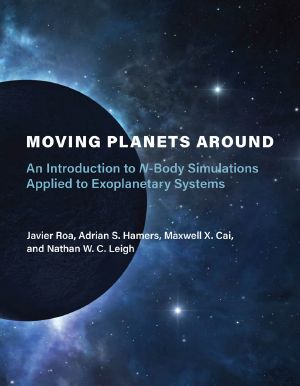Moving Planets Around, An Introduction to N-Body Simulations Applied to Exoplanetary Systems

- Authors
- Roa, Javier & et.al
- Publisher
- MIT Press
- Tags
- n-body integration; integration techniques; dynamical astronomy; gravitation; python; c , c++; euler scheme; runge-kutta methods; numerical errors; numerical convergence; leapfrog integration; variable step-sizeintegration; symplectic integration; guass-radauintegrator; wisdom-holman integrator; object-oriented programming; circumbinary planets; exomoons; scientific publication
- Date
- 2020-09-01T00:00:00+00:00
- Size
- 29.13 MB
- Lang
- en
An introduction to the laws of celestial mechanics and a step-by-step guide to developing software for direct use in astrophysics research. This book offers both an introduction to the laws of celestial mechanics and a step-by-step guide to developing software for direct use in astrophysics research. It bridges the gap between conventional textbooks, which present a rigorous and exhaustive exposition of theoretical concepts, and applying the theory to tackle real experiments. The text is written engagingly in dialogue form, presenting the research journey of the fictional Alice, Bob, and Professor Starmover. Moving Planets Around not only educates students on the laws of Newtonian gravity, it also provides all that they need to start writing their own software, from scratch, for simulating the dynamical evolution of planets and exoplanets, stars, or other heavenly bodies.
The first half of the book develops a fully functional N-body integrator, using state-of-the art integration techniques, explaining both the techniques and the reasons that they are useful. The second half of the book focuses on using an advanced integration scheme to conduct real research, leading students in an investigation of the long-term dynamical stability of extrasolar circumbinary planets. At the end of the journey, students will be ready to design, conduct, and publish peer-review quality research.